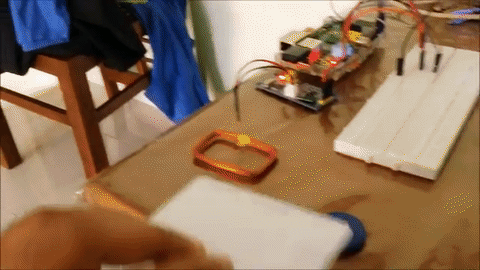How often do you see problems that need fixing? How often do you design your own solutions to them — even if they won’t be implemented at scale? Seeing that many of the municipal parking lots in his native Sri Lanka use a paper ticketing system which is prone to failure, [Shazin Sadakath] whipped up his own solution: an efficient RFID tag logging system.
Digging out an HZ-1050 RFID reader — as well an RFID card and two tags — [Sadakath] set to work connecting it to his Raspberry Pi and cooking up a batch of code and a dashboard to work with. A Python script — using a PiGPIO library — reads the Wiegand Format RFID number, storing it in an SQLite3 database. A Bootstrap, Javascript, and JQuery trifecta make up the dashboard that pulls the RFID info from said server and organizes it into a functional format.
An RFID keyed system like this might be difficult to realize for even a small portion of the parking lots, but it’s a potential solution nonetheless. RFID entry systems can certainly be a functional solution in an office-scale environment for those with similar initiative.

















Wireless systems can be used successfully in security or payment contexts, but if the authentication system isn’t done right (with correct application of cryptography), then you’re just begging for trouble.
In a parking system its not an problem. Normally, you use a 125kHz card loaded with money, and then use that to park your registration number via a terminal (checkin/checkout). The money is then stored in the database, and withdrawn when parking. The card is then only available to the car driver/owner (ergo, card is NOT in windscreen or similiar, but carried by the owner), thus nobody is able to copy it.
But more importantly, IF its copied, its the individual parker who loses money, and its just about 10-20$, its not a huge sum, thus the requirements on security is not high. (and the owner will ofcourse notice if money suddenly start to disappear).
The owner of a card cannot cheat the system either, as if he copies the card, he will have say 2 cards with 10$. If he park with one card for 2$, both cards will then have 8$ thus no advantage to the parker.
In such a system, a card can also be “silent-barried” and a new card is issued, in case a third party copies it and the owner of card complain of lost money. This means the old card will still work as usual with the same sum of money on it, but with the difference that the parking guard will notice its silent-barried and write down the vehicle plate, and then the fraudster can be prosecuted.
Another way to do it, is to make the RFID card like a “parking permit” but that is tied to the payment database, and you “check in” and “check out”. In this case, the RFID card is simply “tied” to the vehicle plate so if a parking guard scan a RFID card in the wrong car, he will ticket it anyways. Thus it does not matter if its copied because its “locked” to the correct car anyways.